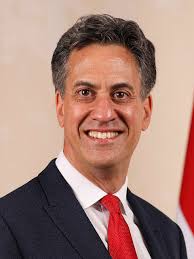Understanding Ed Miliband’s Role in Modern British Politics

Introduction
Ed Miliband, the former leader of the UK Labour Party, has been a significant figure in British politics since his election to Parliament in 2005. As the son of prominent academic Marxist Ralph Miliband, Ed rose to prominence within the Labour Party, becoming party leader in 2010 following a close contest. His journey through the political landscape reflects the shifting dynamics of UK politics and continues to be relevant in contemporary discussions on policies and electoral strategy.
Current Political Landscape
Since stepping down as leader after the 2015 general election, where Labour suffered a significant defeat, Miliband has transitioned into roles that highlight his expertise in various policy areas, particularly in climate change and social justice. Currently serving as the Shadow Secretary of State for Business and Industrial Strategy, he has sought to shape Labour’s policies to address the pressing issues of our time, including energy prices, climate initiatives, and economic reforms. His recent activities have positioned him as a significant influencer within the party, particularly with the ongoing debate regarding Labour’s approach to the environment and the transition to a green economy.
Recent Events and Contributions
As of late 2023, Miliband has been vocal on several pressing matters, often using social media and public platforms to advocate for change. Recent speeches and interviews have seen him tackling the cost-of-living crisis, arguing for stronger support for families affected by soaring energy bills and inflation. Furthermore, he emphasised the necessity for a transition to renewable energy sources to combat climate change, proposing ambitious policies aimed at making the UK a leader in green technology.
Conclusion
Ed Miliband’s political career has been marked by both challenges and achievements. His current role within the Labour Party enables him to push for policies that align with his long-standing commitment to social justice and environmental sustainability. As Labour approaches the next general election, Miliband’s influence could be pivotal in distinguishing the party’s platform, especially regarding economic and environmental issues. Observers predict that with his experience and renewed vigour, he may play a crucial role in shaping not just policy, but also public perception of the Labour Party in the years to come. In a politically charged climate, Miliband’s contributions are sure to resonate with voters looking for comprehensive and thoughtful solutions to the issues facing the UK.
You may also like

Understanding the Current Political Landscape in the UK

Boris Johnson: A Look at His Current Political Landscape
